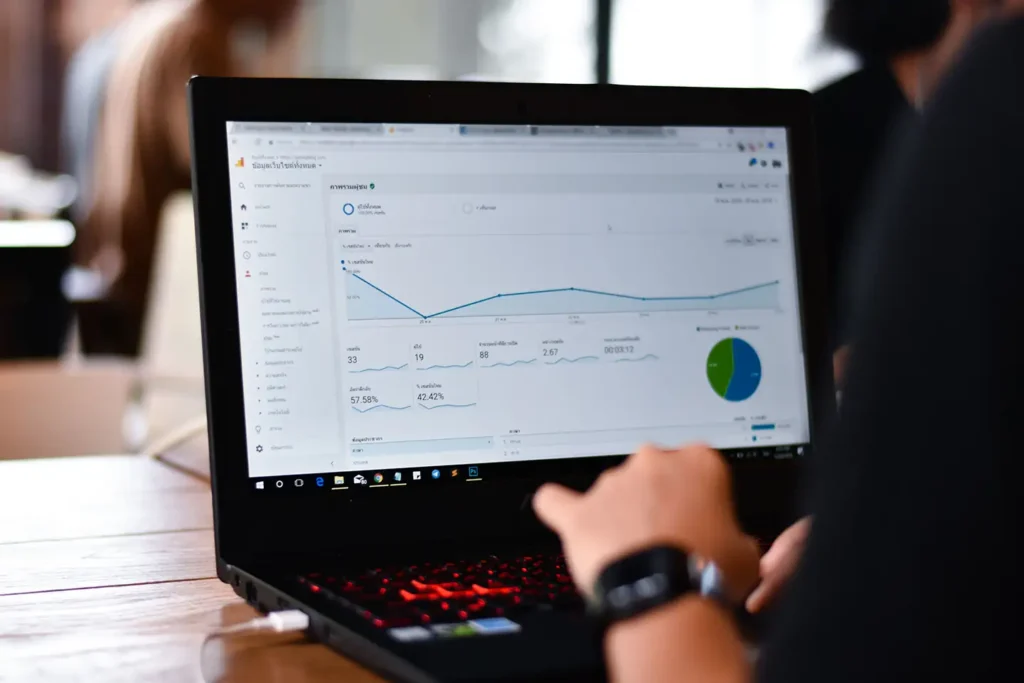In today’s online world, search engine optimization (SEO) is crucial for a website to do well. SEO includes different ways to improve your website’s visibility on search engine results pages (SERPs) through organic search. This helps bring in more visitors and reach your business goals. One important part of SEO is a good user experience. This means giving valuable and relevant content, while also making it easy for people to navigate and access your site.
Understanding SEO: A Comprehensive Overview
SEO is mainly about making your website appealing to search engines and people who visit it. This includes improving different parts of your website. You need to work on your written content and also on technical issues like how fast your site loads and how well it works on mobile devices. It’s also important to have backlinks from other trusted websites.

When you learn how search engines work and adjust your website to fit those needs, you can get better rankings on search results. This helps increase your organic traffic and build a strong online presence in today’s busy digital world.
The Definition and Evolution of SEO
Search engine optimization (SEO) helps websites show up higher in search results on search engines. This is important in digital marketing. The goal is to get more people to visit a website for free by ranking higher for related keywords.
In the beginning, SEO was mostly about changing keywords and backlinks to get better rankings. But now, search engine algorithms have changed. They focus more on user experience and good content.
Today, modern SEO is about making valuable and interesting content that meets what users are looking for. It also follows search engine rules. This includes tasks like keyword research, on-page optimization, link building, and technical SEO. Since search engines keep changing, it’s crucial to stay updated on the best practices and any algorithm updates to keep succeeding.
Why SEO is Integral to Online Success
In today’s competitive online world, having a strong online presence is crucial for businesses. SEO marketing plays an important role in this. It helps to improve online visibility and brings the right visitors to your website.
When your website is more visible, it gets more traffic. This traffic includes potential customers who are looking for products or services similar to yours. Good SEO helps your website rank higher in search results. This makes it easier for people to find and connect with your brand.
In the end, SEO is a long-term investment that can lead to great returns. It targets the right audience – those who truly care about what you sell. By doing this, SEO boosts brand awareness, generates leads, and increases conversions, helping your business succeed online.
The Mechanics of Search Engines
Have you ever thought about how search engines work? It is an interesting process. There are smart systems that explore, list, and rank many web pages. These systems change all the time. They check different things to give the best and most helpful answers for what someone is searching for.
Knowing how this works is key to good SEO. If you understand how search engines function, you can improve your website to match their systems. This can help you rank higher and get more organic traffic.
Crawling, Indexing, and Ranking: How it Works
Search engine algorithms use automated programs called crawlers or bots to find and list web pages. These bots move around the internet, following links from one page to the next, like a spider on a web. When a bot finds a page, it is saved in a large database known as an index.
During indexing, search engines look at the content of the page. They find keywords, topics, and other important information. This is where technical SEO is important. It helps make sure your website is set up correctly, loads fast, and is easy for search engine crawlers to access.
Finally, search engines rank websites in their search results based on many factors. These include relevance, authority, and signals from user experience. For example, Google Search takes into account hundreds of factors and keeps improving its algorithm to give users the best and most accurate information.
The Role of Algorithms in Determining SEO Success
Search engine algorithms are important for showing organic results. These systems are complex and they decide how websites rank in search engine results based on many factors.
Google updates its algorithms regularly. These updates, often named after animals like Panda or Penguin, aim to make search results better and reduce spam. Such updates can change a website’s ranking a lot. Sometimes, sites that use black-hat SEO tactics can get penalized.
It is important to stay updated about Google’s algorithm changes. Adapting your SEO strategies is key to keeping or improving your organic visibility. Good SEO means putting user experience first, creating quality content, and building a strong online presence in genuine ways.
Core Components of SEO
SEO has three main parts: on-page SEO, technical SEO, and off-page SEO. Each part is important for better search engine rankings and getting more organic traffic.
Knowing these elements and using a good SEO plan is key for long-lasting success online. All parts work together to build a website that both search engines and users like.
On-Page SEO: Enhancing Content Relevance
On-page SEO includes all the things you do to improve your website. This means making your website content better and adjusting HTML tags. The goal is to make web pages more focused on certain keywords so they rank higher in search results.
Creating quality content that meets the needs of users is the key part of on-page SEO. Doing good keyword research helps you find the right terms your target audience is using. By naturally including these keywords in your content, you show search engines that your page is relevant.
Also, it’s important to optimize HTML elements. This includes title tags, meta descriptions, and header tags. These parts give brief summaries of your page to search engines. They also affect how your website shows up in search results.
Technical SEO: Optimizing Site Structure
Technical SEO is all about making your website better for search engines. It improves the backend of your site so search engines can easily crawl and index your content. This means your website will work well and be easier for search engines to understand.
One of the key parts of technical SEO is page speed. A website that loads quickly gives users a better experience. Search engines also prefer fast sites. Core Web Vitals are important metrics that show how good the user experience is. These metrics influence Google’s ranking system.
In addition to page speed, technical SEO includes making your site structure better, ensuring it works well on mobile devices, improving security with HTTPS, and making an XML sitemap. This sitemap helps search engines navigate your site’s layout.
Off-Page SEO: Building Authority and Trust
Off-page SEO means actions taken outside your website to boost its ranking in search engines. While on-page SEO is about improving content on your site, off-page SEO focuses on increasing your website’s authority and reputation.
Link building is an important part of off-page SEO. It involves getting high-quality backlinks from trusted websites. These backlinks act like votes, showing search engines that your website is a reliable source of information.
Social media is also part of off-page SEO. It doesn’t directly change your ranking, but it helps bring in traffic and raise brand awareness. Good social media content can lead to more mentions and shares of your brand, which can help improve your website’s authority. Building a strong off-page SEO profile is vital for long-term online visibility and for gaining domain authority.
Keyword Research: The Foundation of SEO
Keyword research is very important for a successful SEO strategy. It means figuring out the words and phrases that people use in search engines when they look for information, products, or services related to your website.
Good keyword research helps you to understand what people are trying to find. It also helps you to reach the right audience and create content that matches what they are searching for online. This way, you can bring the right visitors to your site and increase the chance of turning them into customers.
Identifying Your Target Audience and Their Search Intent
Understanding your target audience is very important for SEO keyword research. You need to find out what the people you want to reach need, what challenges they face, and what interests them.
Figuring out search intent is more than just finding keywords. It means discovering what motivates a user to search. Are they looking for information? Do they want to buy something? Or are they trying to find a specific website? Making your content match search intent is vital for attracting the right audience and getting more conversions.
For example, someone looking for “best running shoes for marathon” has a different goal than someone typing “how to choose running shoes.” Good SEO means creating content for these different search intents.
Tools and Techniques for Effective Keyword Research
Efficient keyword research needs a mix of tools and methods. This helps you gain important insights about what your target audience is searching for.
Many SEO tools can help you with keyword research. For example, Semrush, Ahrefs, and Moz provide useful features. They give you data on search volume, how hard it is to rank for a keyword, and related keywords. You can also use free tools like Google Search Console to find queries that lead users to your website.
Here are some important things to think about when researching keywords:
- Search Volume: This is the average number of times a keyword is searched each month.
- Keyword Difficulty: This shows how hard it might be to rank for a certain keyword.
- Long-Tail Keywords: These are longer and more specific phrases. They usually have less search volume but often lead to higher conversion rates.
Using these tools and looking at search trends can help you build a list of keywords that fit what your target audience is looking for and are easier to rank for.
On-Page SEO Strategies
On-Page SEO means improving each web page to help it show up better in search engines. It’s not just about adding keywords; it’s about making quality content that is useful for your target audience.
When you optimize different parts of a page, you help search engines understand what the page is about and why it should rank higher in search results. A good on-page SEO strategy can lead to better rankings, more visitors, and a greater chance of turning visitors into customers.
Crafting Compelling Content That Ranks
Content marketing is important for SEO. High-quality content helps attract organic traffic and boosts search engine rankings. By creating content that is relevant and engaging for your target audience, you can improve your website’s position on search engine results pages (SERPs).
When you make content, think about the keywords your audience uses. Include these keywords naturally in your text. Avoid cramming too many keywords into your content. Instead, focus on giving value to your audience and answering their questions well.
Organized content is easier for both search engines and users to read. Use clear headings, subheadings, bullet points, and visuals. This can improve engagement, like lower bounce rates and longer time on the site. These are good signs for search engines.
Optimizing Meta Tags and URLs for Better Visibility
In search marketing, first impressions are very important. Your website’s meta tags and URLs help create these impressions. They show up in search engine results pages and can strongly affect how many people click on your link.
A good title tag (that’s the blue clickable headline) should honestly reflect what is on the page. It also needs to have the right keywords. This is the first thing users notice in search results, so it must be clear, short, and interesting.
Also, it’s important to write a helpful and appealing meta description. Even though it doesn’t change your rankings, think of it like your website’s short pitch. It summarizes what the page is about and gets users interested in clicking.
Leveraging Multimedia for Enhanced Engagement
Adding multimedia content, like images, videos, and infographics, does more than make your website look nice. It improves user experience and gives you chances for SEO optimization.
Video SEO is a key part now. By using the right keywords in your video titles, descriptions, and tags, you can help your videos show up in search results. This means you can reach more people beyond just text searches.
Multimedia content makes users engage more. This helps reduce bounce rates and keeps people on your site longer, which search engines like. People usually find visual content more interesting than just text. Think about putting videos in your content or making infographics that make complex info easier to understand.
Technical SEO Essentials
Technical SEO is often ignored, but it’s very important. It helps make sure your website is easy to reach, crawl, and index by search engines. A well-structured website offers a smooth experience for users. This can lead to more engagement and better search rankings.
Improving website speed, site structure, mobile response, site safety, and using structured data are just a few things in technical SEO. These can help your website do better on search engines.
Speed Optimization: Enhancing User Experience
Page speed is very important for how well a website ranks and how users feel when they use it. Today, people want websites that load quickly. If a site takes too long, users can get frustrated and leave, which increases bounce rates. How well your site works affects how satisfied users are. This changes how long visitors stay on your site and if they decide to make a purchase.
There are some easy ways to make page speed better. These include optimizing image sizes, using browser caching, and reducing redirects. Tools like Google PageSpeed Insights can help by giving advice on making your website run faster.
A website that loads quickly makes for a better user experience. It also helps search engines find and list your content more easily. Google sees page speed as a key factor for ranking, so having a faster website can help you get a better spot in search results.
Mobile Optimization: Catering to a Mobile-First World
With more people using mobile devices, making your website mobile-friendly is a must for SEO success. Google Search now focuses on mobile-first indexing. This means Google looks at the mobile version of your site to decide how it ranks and gets listed.
To make your site mobile-friendly, you need responsive web design. This helps your layout and content fit well on different screen sizes. Also, pay attention to technical SEO such as mobile page speed and a clear mobile site structure. These factors improve the user experience for mobile visitors.
When users have a good mobile experience, they stay longer on your site, bounce less, and this can lead to better rankings in mobile search results. Since mobile search is so dominant, ignoring mobile optimization can greatly affect your site’s visibility and reach.
Off-Page SEO Tactics
On-page and technical SEO factors are things you can control directly. Off-page SEO tactics happen outside your website. These tactics focus on improving your site’s authority and reputation. This can help search engines see your website as a reliable source of information.
Getting high-quality backlinks from trusted websites is a strong sign of authority for search engines. You should also use social media marketing regularly, manage your online reputation, and take part in industry forums. These are helpful off-page SEO tactics.
The Power of Backlinks in SEO
Backlinks are very important for getting a higher rank in search engine results pages (SERPs). You can think of them like votes of trust from other websites. They show that your content is good and reliable.
Link building is how you get backlinks from other sites. This is a key part of off-page SEO. It means making quality content that people want to link to. It also involves reaching out to related websites and making connections in your field.
But not all backlinks are the same. Backlinks from well-known and high-authority websites are more valuable. That’s why a good link-building strategy focuses more on getting quality links rather than many links.
Social Media’s Role in Off-Page SEO
Social media has an important role in off-page SEO. While it doesn’t directly affect ranking, it helps in raising brand awareness, driving traffic to your website, and improving your online visibility. These factors may indirectly help your SEO.
When you create fun and shareable content, you can reach more people. This increases the chances of getting external links to your site. Sharing your website content on social media gets it seen by more people, which can lead to more backlinks.
Also, getting likes, shares, and comments on social media can help build your brand’s authority and trust. This boosts your overall SEO efforts. Having a strong social media presence supports your off-page SEO strategy and expands your brand’s reach and influence.
Local SEO: Targeting Your Geographical Audience
For businesses that have a physical store or want to reach people in a specific area, local SEO is important. It helps you attract local customers by improving your online presence. This way, you can rank better in searches that are specific to your location.
Local SEO includes making content that relates to your area, improving your Google Business Profile, and listing your business in local directories. These steps help your business show up in searches like “restaurants near me” or “plumbers in [your city].”
Importance of Google My Business and Local Listings
Local SEO is all about improving your Google Business Profile. You can think of it as your online store. It shares important details like your business name, address, phone number, website, and customer reviews. This profile is key to bringing in local customers.
To keep customers informed, your local listings must be accurate and current on different platforms. Having these listings helps build your trust and makes it easier for people to find you.
Apart from Google My Business, there are other local directories that can help you be seen online. Yelp, Apple Maps, Facebook, and directories specific to your industry are all important for enhancing your local SEO efforts.
Local Content and Keywords: Connecting with Local Audiences
Creating content for your local audience is very important for local SEO success. You need to give useful information that relates to the people in your community. This could be blog posts about local events, guides for local businesses, or case studies about local clients.
While doing keyword research, include location-based keywords. These are what people use in Google Search when looking for businesses like yours nearby. For example, a café in Seattle might use keywords like “best coffee shops Seattle” or “cozy cafes Capitol Hill.”
By adding local keywords smoothly in your website content and optimizing your Google Business Profile with the right information, you can better reach local searches. This increases the chance of attracting customers who are close by. It’s important to stay relevant. Making sure your content matches local interests and search queries can help you connect well with your target audience.
Monitoring and Measuring SEO Success
SEO is a never-ending task. It’s important to keep checking how well it works for constant improvement. By regularly looking at key numbers, you can see what is working, find places to improve, and show how your SEO work pays off.
There are many tools to help. Google Analytics is a popular tool to track website traffic, user behavior, and conversions. By analyzing these numbers, you can learn how users get to your site, how they engage with your content, and if your SEO strategies are giving you the results you want.
Essential SEO Metrics and KPIs to Track
To gauge the effectiveness of your SEO efforts, it’s essential to track relevant metrics and KPIs (Key Performance Indicators). SEO metrics provide valuable insights into your website’s performance and guide you toward data-driven decisions.
Google Analytics is an invaluable tool for tracking various SEO metrics. It provides a wealth of data, allowing you to measure website traffic, user behavior, conversions, and more. By setting up goals and tracking conversions related to your SEO efforts – such as form submissions, downloads, or purchases – you can directly measure the impact of your strategies on business outcomes.
Here are some essential SEO KPIs to monitor:
| Metric | Description |
| Organic Traffic | Visitors from unpaid search results |
| Keyword Rankings | Positions for targeted keywords |
| Bounce Rate | Percentage of visitors leaving after viewing one page |
| Conversion Rate | Percentage of visitors taking a desired action |
| Backlinks | Links from external websites |
Utilizing Analytics for Continuous Improvement
Google Analytics is a great tool for improving SEO. It gives you important insights into how users behave on your website. With this information, you can adjust your strategies to make your site work better.
You can check metrics like bounce rate, time on page, and exit pages. This helps you see where users may have problems or leave your site too soon. You can use this data to improve your content, make it easier to navigate your website, or improve calls to action for better engagement.
Keep in mind that SEO is not something you just do once. It needs regular checking and changes. By consistently watching and understanding the data from Google Analytics, you can make sure your SEO strategies are still effective in the changing online world.
Future Trends in SEO
The world of SEO is always changing. New technologies and how people use the internet are shaping its future. It’s important to keep up with new trends. This helps you change your strategies and stay ahead.![]()
Two major trends are artificial intelligence and voice search. These changes will change how users search for and interact with online content. To keep their online visibility, businesses must adapt to these changes. They need to reach their target audiences effectively.
The Impact of AI and Machine Learning on SEO
Artificial intelligence (AI) and machine learning are quickly changing the SEO industry. They are affecting how websites are optimized, how content is created, and how search results are delivered. It is important for marketers to understand these changes to stay ahead.
AI-powered SEO tools can look at large amounts of data. These tools help marketers get useful insights about user behavior, keyword research, and content optimization. They also automate boring SEO tasks, allowing marketers to work on more strategic plans.
In addition, AI is changing how search engines understand what users want. Machine learning can spot patterns in search queries. This leads to results that are more accurate and personalized. As AI and machine learning keep advancing, they will be even more important in shaping the SEO industry in the future.
Voice Search Optimization: Preparing for the Future
The popularity of voice assistants, like Siri and Alexa, has increased voice search. This change has made digital marketers change their SEO strategies to fit this way of searching. Voice search optimization means adjusting your website content to match the way people talk when they give voice commands.
You should use long-tail keywords and natural speaking phrases because voice searches are usually longer and more casual than typing. Also, make sure your website gives clear and simple answers to common questions in your field.
A good user experience is very important for voice search. This means your website should work well on mobile devices, load quickly, and use organized data. This helps search engines understand and show your content correctly.
Conclusion
In conclusion, it’s very important to understand the basics of SEO. This knowledge helps you create a strong online presence. By using both on-page and off-page strategies, doing keyword research, and fixing technical issues, you can improve your website’s visibility. This will help you get more organic traffic.
Also, monitoring key metrics and adjusting to new trends is necessary for long-term SEO success. As technology grows, you should look into AI, voice search optimization, and focus on user experience. These steps will guide the future of SEO.
Stay updated, keep improving your strategies, and see your website rise in search engine results. SEO changes constantly. Staying ahead is crucial for staying relevant online and growing your business.
Frequently Asked Questions
What is the best way to start with SEO for beginners?
For beginners, the first steps in SEO are to understand your target audience. You should conduct keyword research and improve your website content using relevant keywords. Use free SEO tools and explore the many online resources to learn the basics of SEO. This will help you start seeing organic growth.
How long does it take to see results from SEO?
SEO is a plan that works over a long time. It needs patience and steady effort. Some SEO work might show results in a few months. However, big jumps in organic traffic usually take several months to a year. This timeline depends on your industry and how much competition you have.
Can SEO work for any type of business?
SEO is useful for all kinds of businesses, no matter how big or small they are or what industry they belong to. Whether you run an e-commerce store, a local shop, or have a blog, having a strong online presence with SEO is important. It helps you reach your target audience in today’s digital world.
How do Google’s algorithm updates affect my site’s SEO?
Google’s algorithm updates can change how your website ranks in search results. It is important to stay aware of these changes. You should also adjust your SEO strategy to keep or boost your visibility.
Is it necessary to hire an SEO expert or can I do it myself?
Doing your own SEO is possible. However, SEO can be complicated and always changes. This is why it is a good idea to hire an expert. This is especially true for businesses that do not have much time or money. At the same time, taking the time to learn about SEO can help anyone.



